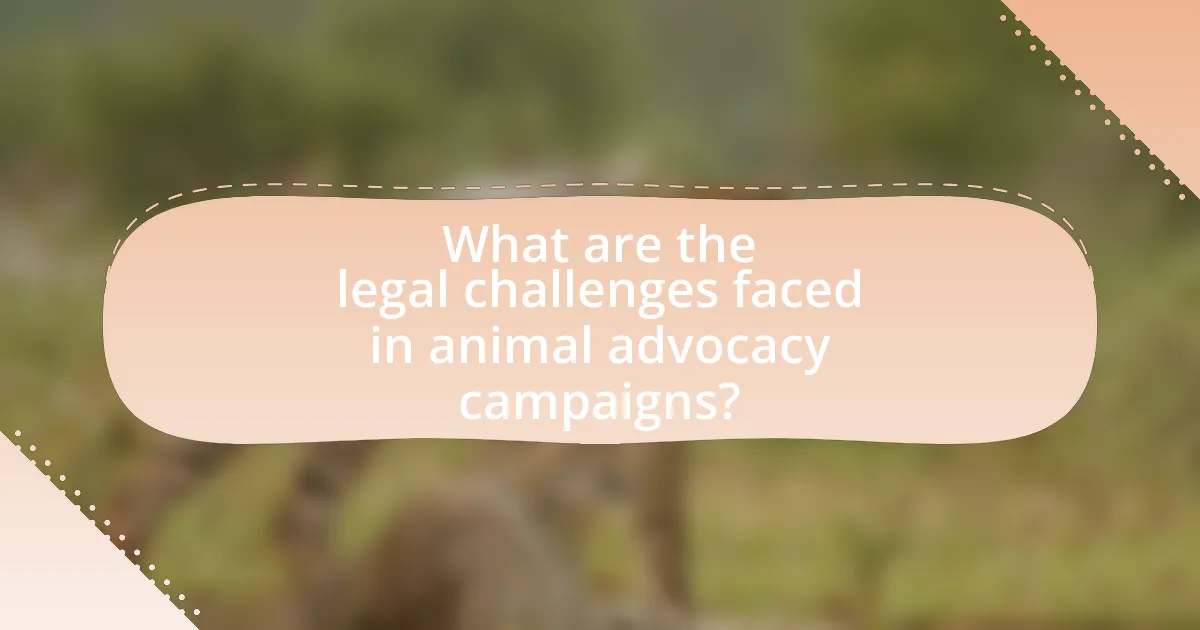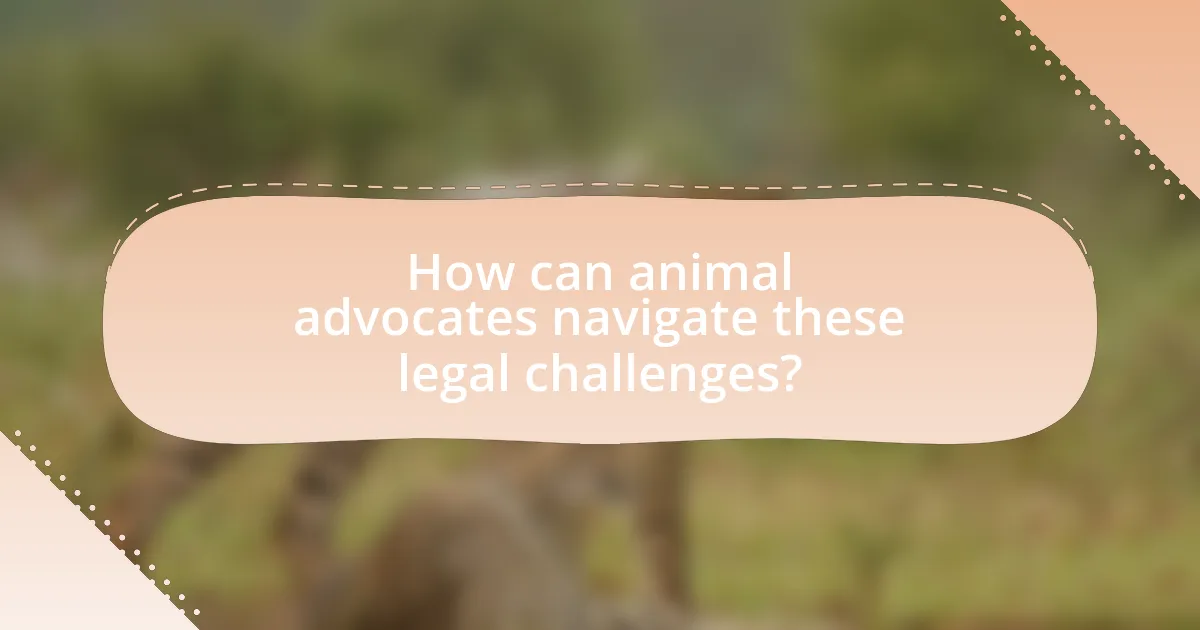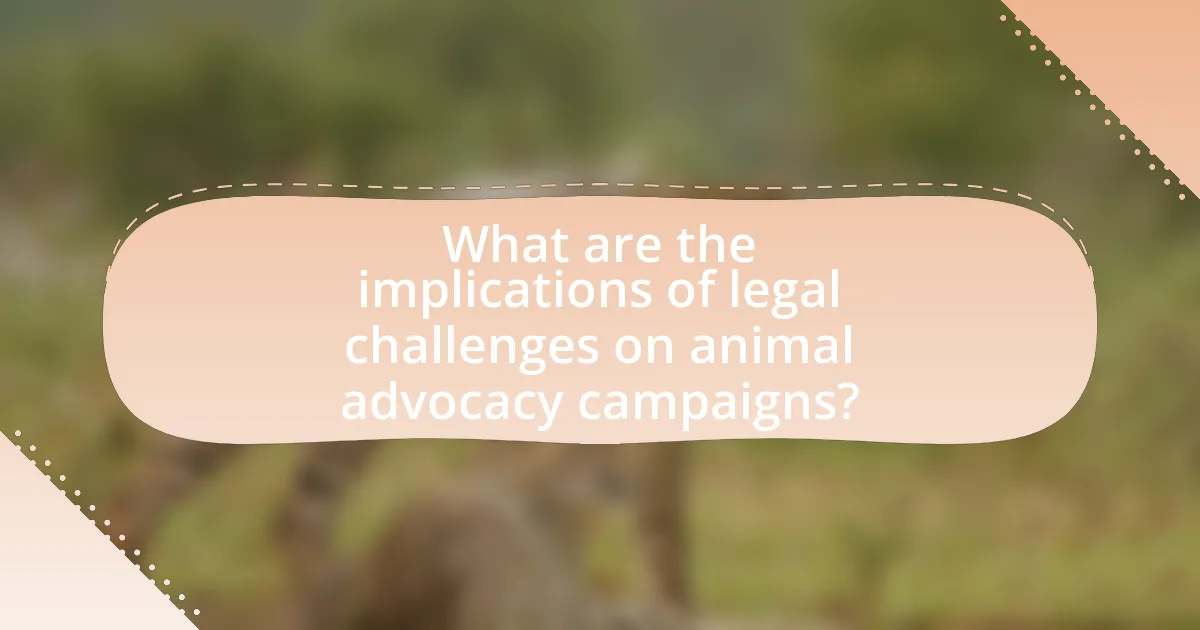The article focuses on the legal challenges faced by animal advocacy campaigns, highlighting issues such as restrictions on free speech, anti-protest laws, and the complexities of animal welfare legislation. It examines how laws impact advocacy efforts, detailing specific regulations like the Animal Welfare Act and the variations in animal rights laws across different regions. The piece also discusses common legal obstacles, strategies for compliance, and the importance of legal guidance in navigating these challenges. Additionally, it addresses the implications of legal issues on public perception, fundraising, and the overall effectiveness of animal advocacy initiatives.

What are the legal challenges faced in animal advocacy campaigns?
Animal advocacy campaigns face several legal challenges, including restrictions on free speech, anti-protest laws, and legal repercussions for trespassing or property damage. These challenges arise as advocates often engage in direct action or protests to raise awareness about animal rights, which can conflict with local ordinances or state laws designed to maintain public order. For instance, some jurisdictions have enacted laws that criminalize certain forms of protest, particularly those that disrupt business operations, thereby limiting the ability of advocates to effectively communicate their message. Additionally, animal advocacy organizations may encounter legal hurdles when attempting to challenge animal cruelty laws or regulations that protect industries such as agriculture and research, as these laws often have strong legal protections and lobbying support.
How do laws impact animal advocacy efforts?
Laws significantly impact animal advocacy efforts by establishing the legal framework within which these initiatives operate. For instance, legislation such as the Animal Welfare Act in the United States sets minimum standards for the treatment of animals, influencing how advocates can push for reforms and protections. Additionally, laws regarding animal rights can either empower or hinder advocacy campaigns; for example, stricter regulations on animal testing can bolster advocacy efforts aimed at promoting alternatives, while laws that limit protests or demonstrations can restrict the ability of advocates to mobilize public support. Thus, the legal landscape directly shapes the strategies and effectiveness of animal advocacy initiatives.
What specific laws govern animal rights and welfare?
The specific laws that govern animal rights and welfare include the Animal Welfare Act (AWA) in the United States, which sets standards for the treatment of animals in research, exhibition, and transport. Additionally, various state laws provide further protections, such as anti-cruelty statutes that prohibit neglect and abuse. The European Union has established regulations like the Treaty on the Functioning of the European Union, which recognizes animals as sentient beings and mandates their welfare. These laws are enforced through agencies such as the United States Department of Agriculture (USDA) and local animal control authorities, ensuring compliance and addressing violations.
How do these laws vary by region or country?
Animal welfare laws vary significantly by region and country, reflecting differing cultural values, economic conditions, and political priorities. For instance, European countries like Germany and the Netherlands have stringent animal protection laws, often requiring humane treatment and prohibiting certain practices, while countries such as the United States have a patchwork of state laws that can vary widely in their protections and enforcement. In some regions, such as parts of Asia, animal welfare legislation may be less developed, leading to fewer protections for animals. This variation is evidenced by the fact that the Animal Welfare Act in the U.S. only covers certain animals and does not address all forms of animal exploitation, whereas the European Union has comprehensive regulations that apply to all member states, mandating higher welfare standards.
What are common legal obstacles encountered by animal advocates?
Common legal obstacles encountered by animal advocates include restrictive animal welfare laws, challenges in proving animal cruelty, and limitations on fundraising activities. Restrictive laws often prioritize agricultural interests over animal rights, making it difficult for advocates to push for stronger protections. Additionally, proving animal cruelty can be complex due to the need for substantial evidence and legal definitions that vary by jurisdiction. Furthermore, fundraising limitations can hinder the ability of organizations to mobilize resources effectively, as some states impose strict regulations on charitable solicitations. These obstacles collectively impede the progress of animal advocacy efforts.
How can legal restrictions limit campaign strategies?
Legal restrictions can significantly limit campaign strategies by imposing regulations on fundraising, advertising, and messaging. For instance, laws governing campaign finance can restrict the amount of money that can be raised or spent, thereby constraining the resources available for outreach and advocacy efforts. Additionally, regulations on false advertising can prevent campaigns from using certain persuasive tactics or claims that could mislead the public. These legal frameworks are designed to ensure transparency and fairness in campaigning, but they can also hinder the ability of organizations to effectively communicate their messages and mobilize support.
What role do defamation and slander laws play in advocacy?
Defamation and slander laws play a critical role in advocacy by protecting individuals and organizations from false statements that could harm their reputation. These laws deter malicious misinformation, which is particularly important in advocacy contexts where public perception can significantly influence support and funding. For instance, in animal advocacy, false claims about an organization’s practices can undermine its credibility and effectiveness. Legal frameworks surrounding defamation and slander provide recourse for those harmed by untrue statements, thereby fostering a more truthful discourse in advocacy efforts. This legal protection encourages advocates to speak out on issues without fear of unjust retaliation, promoting a healthier environment for public debate and activism.

How can animal advocates navigate these legal challenges?
Animal advocates can navigate legal challenges by understanding relevant laws and regulations that govern animal welfare and advocacy. Familiarity with local, state, and federal legislation, such as the Animal Welfare Act, enables advocates to operate within legal frameworks while effectively promoting animal rights. Additionally, collaborating with legal experts who specialize in animal law can provide crucial guidance on compliance and strategic advocacy. Research indicates that organizations that engage legal counsel are more successful in addressing legal obstacles, as they can better anticipate potential legal issues and develop proactive strategies.
What strategies can be employed to ensure compliance with laws?
To ensure compliance with laws in animal advocacy campaigns, organizations should implement comprehensive legal training for staff and volunteers. This training should cover relevant laws, regulations, and best practices specific to animal welfare and advocacy. Additionally, establishing a compliance officer role can help monitor adherence to legal standards and provide guidance on legal matters. Regular audits of campaign activities against legal requirements can further identify potential compliance issues before they escalate. Research indicates that organizations with structured compliance programs experience fewer legal challenges, as seen in studies by the Association of Corporate Counsel, which highlight the effectiveness of proactive compliance measures in reducing legal risks.
How can advocates stay informed about changing legislation?
Advocates can stay informed about changing legislation by subscribing to legal updates from reputable organizations and utilizing online resources that track legislative changes. Many advocacy groups, such as the Animal Legal Defense Fund, provide newsletters and alerts that summarize relevant legal developments. Additionally, platforms like Congress.gov and state legislative websites offer real-time updates on bills and laws affecting animal advocacy. Engaging with professional networks and attending relevant conferences also helps advocates gain insights into legislative trends and changes.
What resources are available for legal guidance in advocacy?
Legal guidance in advocacy can be accessed through various resources, including legal aid organizations, law clinics, and online legal databases. Legal aid organizations, such as the Animal Legal Defense Fund, provide resources specifically tailored to animal advocacy, offering legal advice and representation. Law clinics at universities often focus on public interest law, allowing students to gain experience while providing free legal assistance to advocacy groups. Online legal databases, such as Westlaw and LexisNexis, offer comprehensive legal research tools that can help advocates understand relevant laws and regulations. These resources collectively support advocates in navigating legal challenges effectively.
What are the best practices for legal risk management in campaigns?
The best practices for legal risk management in campaigns include conducting thorough legal research, ensuring compliance with applicable laws, and implementing risk assessment strategies. Legal research helps identify potential legal issues related to campaign activities, such as advertising regulations and intellectual property rights. Compliance with laws, including those governing animal welfare and fundraising, mitigates the risk of legal penalties. Additionally, risk assessment strategies, such as developing contingency plans and obtaining legal counsel, further protect campaigns from unforeseen legal challenges. These practices are essential for maintaining the integrity and effectiveness of animal advocacy campaigns.
How can advocates prepare for potential legal disputes?
Advocates can prepare for potential legal disputes by conducting thorough research on relevant laws and regulations governing animal advocacy. This preparation includes understanding local, state, and federal laws that may impact their campaigns, as well as familiarizing themselves with legal precedents in animal rights cases. For instance, advocates should review cases such as Animal Legal Defense Fund v. Wasden, which highlights the legal complexities surrounding animal advocacy. Additionally, maintaining detailed records of all campaign activities and communications can provide essential documentation in the event of a dispute. Engaging legal counsel experienced in animal law can also help advocates navigate potential legal challenges effectively.
What role does insurance play in protecting advocacy efforts?
Insurance plays a critical role in protecting advocacy efforts by providing financial coverage against potential legal liabilities and risks associated with advocacy activities. This financial protection allows organizations to engage in campaigns without the constant fear of incurring costs from lawsuits or legal actions that may arise from their advocacy work. For instance, liability insurance can cover legal fees and settlements, enabling advocates to focus on their mission rather than financial burdens. Additionally, having insurance can enhance the credibility of advocacy organizations, as it demonstrates a commitment to responsible practices and risk management, which can attract more supporters and funding.

What are the implications of legal challenges on animal advocacy campaigns?
Legal challenges significantly impact animal advocacy campaigns by hindering their effectiveness and altering their strategies. These challenges can lead to increased legal costs, diverting resources away from advocacy efforts towards legal defenses. For instance, lawsuits against animal rights organizations can result in financial strain, limiting their ability to fund campaigns or outreach programs. Additionally, legal setbacks can create a chilling effect, discouraging activists from pursuing bold initiatives due to fear of litigation. Historical examples, such as the legal battles faced by organizations like PETA, illustrate how legal challenges can delay or derail campaigns aimed at promoting animal welfare. Overall, the implications of legal challenges are profound, affecting both the operational capacity and the strategic direction of animal advocacy efforts.
How do legal issues affect public perception of animal advocacy?
Legal issues significantly influence public perception of animal advocacy by shaping the narrative around animal rights and welfare. When legal frameworks are perceived as inadequate or overly punitive, public support for advocacy efforts may diminish, as seen in cases where activists face legal repercussions for their actions. For instance, high-profile legal battles, such as those involving animal rights organizations and corporations, can polarize public opinion, leading to either increased support for the cause or backlash against perceived extremism. Additionally, legal victories, such as the passage of animal protection laws, can enhance the credibility of advocacy groups and foster a more favorable public image, as evidenced by the increased donations and volunteerism following successful legislative changes. Thus, the interplay between legal challenges and public perception is critical in determining the effectiveness and acceptance of animal advocacy initiatives.
What impact do legal battles have on fundraising and support?
Legal battles significantly hinder fundraising and support for organizations involved in animal advocacy. When legal disputes arise, potential donors may perceive the organization as unstable or risky, leading to decreased financial contributions. For instance, a study by the Nonprofit Risk Management Center found that organizations embroiled in legal issues often experience a 30% drop in donations during the litigation period. Additionally, ongoing legal challenges can divert resources and attention away from fundraising efforts, further exacerbating the decline in support.
What lessons can be learned from past legal cases in animal advocacy?
Past legal cases in animal advocacy reveal critical lessons about the effectiveness of legal strategies and the importance of public support. For instance, the case of Animal Legal Defense Fund v. Wasden highlighted the necessity of clear legal definitions regarding animal rights, demonstrating that ambiguous laws can hinder advocacy efforts. Additionally, the successful prosecution of animal cruelty cases, such as the case against Michael Vick for dog fighting, underscores the power of media attention in galvanizing public opinion and influencing legal outcomes. These cases illustrate that strategic legal action, combined with public engagement, can lead to significant advancements in animal welfare legislation.
How have successful campaigns navigated legal challenges?
Successful campaigns have navigated legal challenges by employing strategic legal frameworks and proactive engagement with regulatory bodies. For instance, organizations like the Animal Legal Defense Fund have utilized litigation to challenge unjust laws, thereby setting legal precedents that benefit animal advocacy. Additionally, successful campaigns often collaborate with legal experts to ensure compliance with existing laws while advocating for legislative changes, as seen in the passage of laws that enhance animal welfare protections. These approaches demonstrate that a combination of legal action and advocacy can effectively address and overcome legal obstacles in animal advocacy campaigns.
What mistakes should advocates avoid based on previous experiences?
Advocates should avoid making sweeping generalizations about legal outcomes based on isolated cases. Previous experiences have shown that such assumptions can lead to ineffective strategies and wasted resources. For instance, in the case of the Animal Legal Defense Fund v. Wasden, advocates assumed that a similar approach would yield the same results in different jurisdictions, which did not hold true. This highlights the importance of conducting thorough research and understanding the specific legal context of each campaign. Additionally, advocates should refrain from neglecting the importance of building coalitions with other organizations, as demonstrated by the success of collaborative efforts in campaigns like the one against puppy mills, which gained traction through unified action.
What practical tips can help advocates effectively manage legal challenges?
Advocates can effectively manage legal challenges by developing a comprehensive understanding of relevant laws and regulations. This knowledge enables them to navigate legal frameworks that impact animal advocacy, ensuring compliance and strategic planning. Additionally, maintaining clear documentation of all activities and communications helps create a robust defense in case of legal disputes. Engaging with legal experts who specialize in animal law provides advocates with tailored advice and insights, enhancing their ability to address specific legal issues. Furthermore, building coalitions with other advocacy groups can amplify resources and support, creating a united front against legal challenges. These strategies are supported by the fact that organizations with legal expertise and collaborative networks often experience more favorable outcomes in legal matters.
How can collaboration with legal experts enhance advocacy efforts?
Collaboration with legal experts enhances advocacy efforts by providing specialized knowledge that informs strategies and strengthens legal arguments. Legal experts can identify relevant laws and regulations, ensuring that advocacy campaigns comply with legal standards while effectively addressing issues related to animal rights. For instance, legal professionals can assist in drafting petitions, formulating litigation strategies, and navigating complex legal frameworks, which increases the likelihood of successful outcomes. Additionally, their expertise can help advocates understand the legal implications of their actions, thereby minimizing risks and maximizing the impact of their campaigns.
What proactive measures can be taken to minimize legal risks?
To minimize legal risks in animal advocacy campaigns, organizations should implement comprehensive legal compliance training for staff and volunteers. This training ensures that all participants understand relevant laws and regulations, reducing the likelihood of unintentional violations. Additionally, conducting regular risk assessments can identify potential legal vulnerabilities, allowing organizations to address them proactively. Establishing clear communication channels for reporting concerns and seeking legal advice further mitigates risks. According to a study by the Animal Legal Defense Fund, organizations that prioritize legal education and risk management strategies experience significantly fewer legal challenges, demonstrating the effectiveness of these proactive measures.